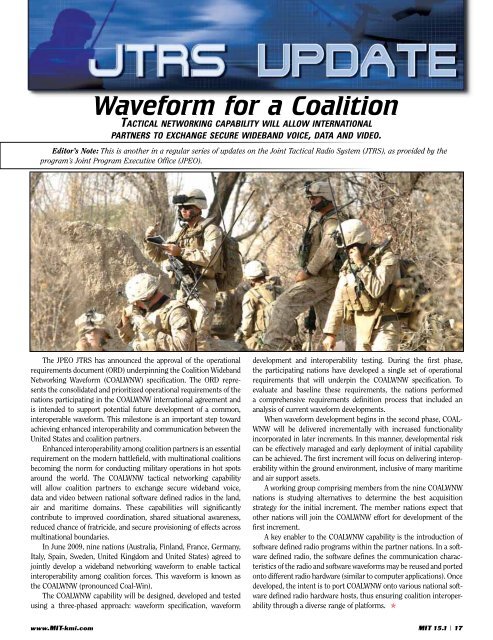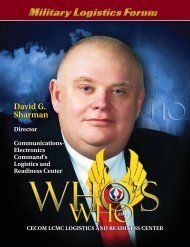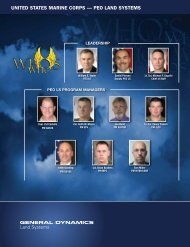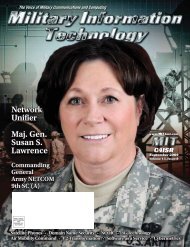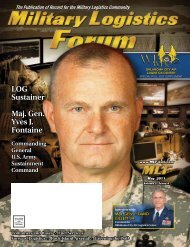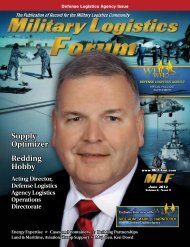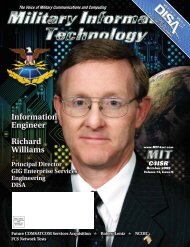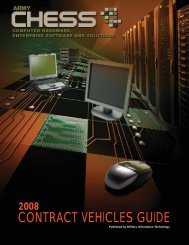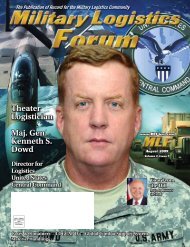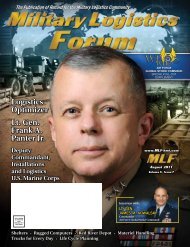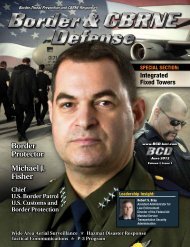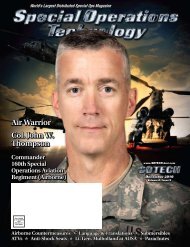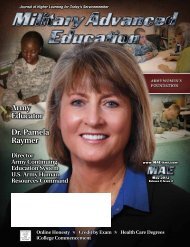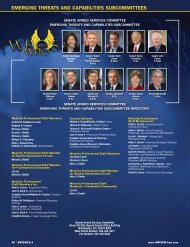C4 Marine Brig. Gen. Kevin J. Nally - KMI Media Group
C4 Marine Brig. Gen. Kevin J. Nally - KMI Media Group
C4 Marine Brig. Gen. Kevin J. Nally - KMI Media Group
You also want an ePaper? Increase the reach of your titles
YUMPU automatically turns print PDFs into web optimized ePapers that Google loves.
Waveform for a Coalition<br />
taCtICal networkIng CaPaBIlIty wIll allow InternatIonal<br />
Partners to exChange seCure wIdeBand voICe, data and vIdeo.<br />
Editor’s Note: This is another in a regular series of updates on the Joint Tactical Radio System (JTRS), as provided by the<br />
program’s Joint Program Executive Office (JPEO).<br />
The JPEO JTRS has announced the approval of the operational<br />
requirements document (ORD) underpinning the Coalition Wideband<br />
Networking Waveform (COALWNW) specification. The ORD represents<br />
the consolidated and prioritized operational requirements of the<br />
nations participating in the COALWNW international agreement and<br />
is intended to support potential future development of a common,<br />
interoperable waveform. This milestone is an important step toward<br />
achieving enhanced interoperability and communication between the<br />
United States and coalition partners.<br />
Enhanced interoperability among coalition partners is an essential<br />
requirement on the modern battlefield, with multinational coalitions<br />
becoming the norm for conducting military operations in hot spots<br />
around the world. The COALWNW tactical networking capability<br />
will allow coalition partners to exchange secure wideband voice,<br />
data and video between national software defined radios in the land,<br />
air and maritime domains. These capabilities will significantly<br />
contribute to improved coordination, shared situational awareness,<br />
reduced chance of fratricide, and secure provisioning of effects across<br />
multinational boundaries.<br />
In June 2009, nine nations (Australia, Finland, France, Germany,<br />
Italy, Spain, Sweden, United Kingdom and United States) agreed to<br />
jointly develop a wideband networking waveform to enable tactical<br />
interoperability among coalition forces. This waveform is known as<br />
the COALWNW (pronounced Coal-Win).<br />
The COALWNW capability will be designed, developed and tested<br />
using a three-phased approach: waveform specification, waveform<br />
development and interoperability testing. During the first phase,<br />
the participating nations have developed a single set of operational<br />
requirements that will underpin the COALWNW specification. To<br />
evaluate and baseline these requirements, the nations performed<br />
a comprehensive requirements definition process that included an<br />
analysis of current waveform developments.<br />
When waveform development begins in the second phase, COAL-<br />
WNW will be delivered incrementally with increased functionality<br />
incorporated in later increments. In this manner, developmental risk<br />
can be effectively managed and early deployment of initial capability<br />
can be achieved. The first increment will focus on delivering interoperability<br />
within the ground environment, inclusive of many maritime<br />
and air support assets.<br />
A working group comprising members from the nine COALWNW<br />
nations is studying alternatives to determine the best acquisition<br />
strategy for the initial increment. The member nations expect that<br />
other nations will join the COALWNW effort for development of the<br />
first increment.<br />
A key enabler to the COALWNW capability is the introduction of<br />
software defined radio programs within the partner nations. In a software<br />
defined radio, the software defines the communication characteristics<br />
of the radio and software waveforms may be reused and ported<br />
onto different radio hardware (similar to computer applications). Once<br />
developed, the intent is to port COALWNW onto various national software<br />
defined radio hardware hosts, thus ensuring coalition interoperability<br />
through a diverse range of platforms. O<br />
www.MIT-kmi.com MIT 15.1 | 17


